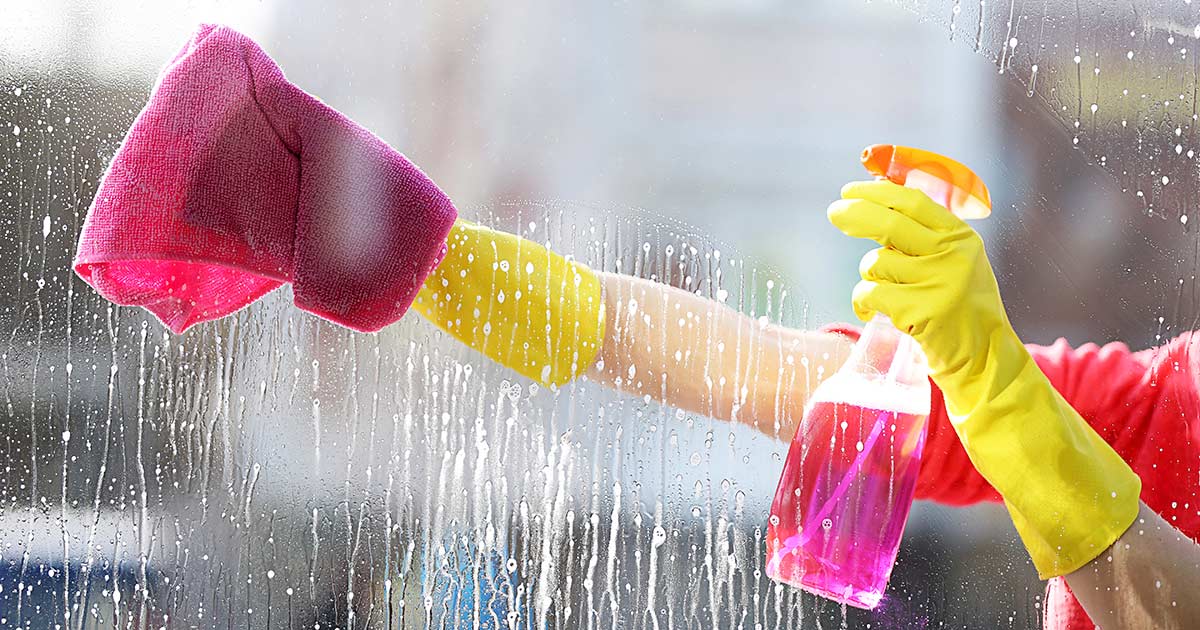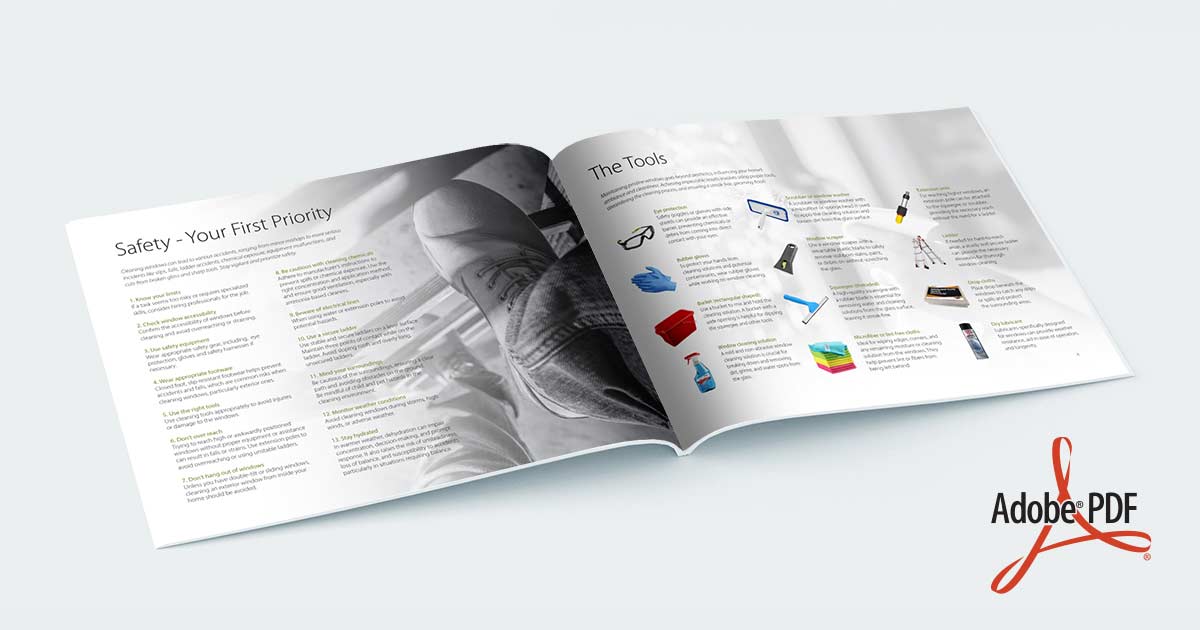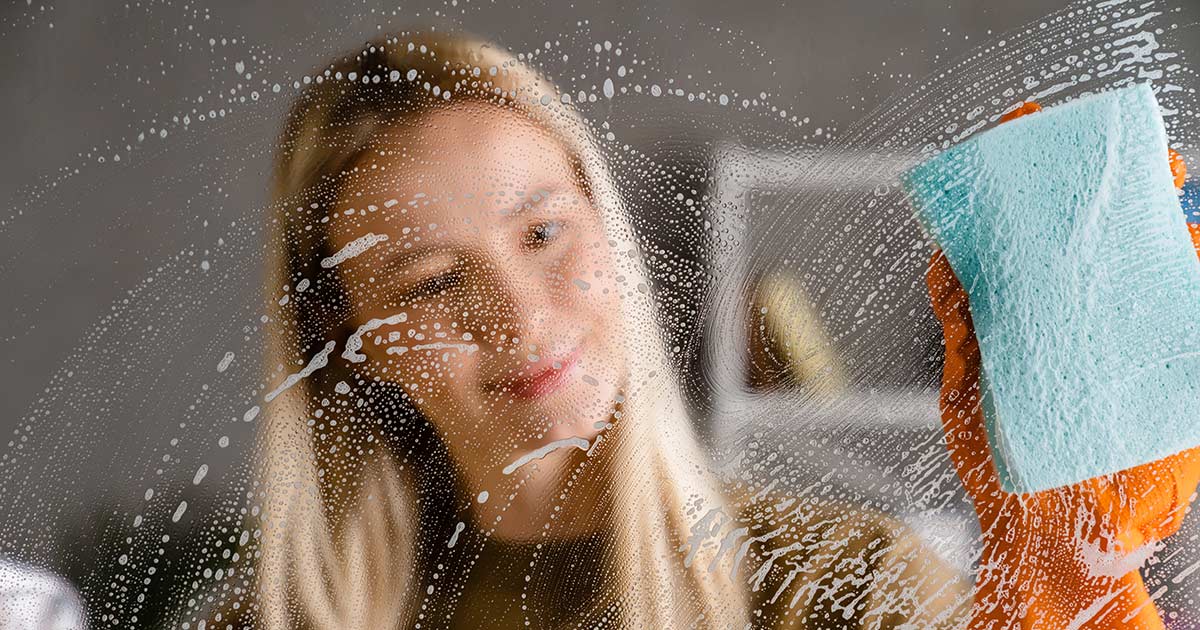Insights > Article > Posted: 2023-Nov-16, Updated: 2025-Dec-24
Window Cleaning Myths vs Reality: Smart Advice for Ottawa Homeowners

In this article:
Ready to clear up your window cleaning routine? Our comprehensive guide cuts through the clutter of myths and reveals the truth about cleaning solutions, tools, and techniques. Dive in and discover how to achieve sparkling, streak-free windows with confidence!
Choosing the Right
Cleaning Solutions
Selecting the right cleaning solution for your windows is crucial. Understand the unique needs of your glass to avoid damage and ensure a spotless finish.
Myth 1.
Ammonia is always a good ingredient in window cleaners.
Ammonia can indeed be effective in some cases, but it’s not always suitable for every type of glass. It can potentially damage certain window coatings, so it's essential to check the manufacturer's guidelines before using ammonia-based cleaners.
Myth 2.
Vinegar is the best all-purpose window cleaner.
While vinegar is a popular choice, it may not be ideal for all window types. It can damage some materials and has a strong odor that many find unpleasant. Commercial cleaners designed for specific glass types often provide more effective and safer results.
Myth 3.
More detergent means better cleaning.
Using excess detergent can actually leave streaks on your windows and attract more dirt. It's best to follow the recommended amount for optimal cleaning results.
Myth 4.
Homemade cleaning solutions are always safe.
Not all DIY cleaners are suitable for every type of window. Before using a homemade solution, test it on a small, inconspicuous area to ensure it doesn't cause any damage.
Myth 5.
All cleaning solutions are interchangeable.
Different windows have unique cleaning needs, and using a one-size-fits-all approach can lead to less effective cleaning or potential damage. Always choose cleaning solutions that are specifically recommended for your window type.
Myth 6.
Cleaning windows with hot water is always better.
Hot water can cause cleaning solutions to evaporate too quickly, which might lead to streaks. Lukewarm water is often a better choice for achieving a spotless finish.
Choosing the Right
Cleaning Tools
Choosing the right tools is crucial for safe and effective window cleaning. Adapt your tools based on your window type to avoid damage.
Myth 7.
Razor blades are safe for all window surfaces.
Razor blades can cause damage to coated or tinted windows if not used carefully. It's important to follow manufacturer guidelines and use them with caution.
Myth 8.
Steel wool is a safe abrasive for cleaning windows.
Steel wool can scratch glass surfaces and is generally not recommended for window cleaning. Opt for non-abrasive materials to avoid damaging your windows.
Myth 9.
All sponges are suitable for window cleaning.
Some sponges can scratch the glass. It’s better to use soft, non-abrasive sponges or microfiber cloths to prevent any damage.
Myth 10.
Any towel can be used to dry windows.
Coarse towels can leave lint on your windows. For a streak-free finish, microfiber cloths or squeegees are the best choice.
Myth 11.
Metal scrapers are always necessary for window cleaning.
While metal scrapers can be useful, plastic or rubber scrapers are often safer alternatives and can prevent damage to your windows.
Myth 12.
Newspaper is the best material for wiping windows.
Modern newspapers can leave streaks and ink residues. Microfiber cloths or squeegees generally provide better results for a clear finish.
Myth 13.
All commercial window cleaning solutions are the same.
Commercial cleaners vary in their formulations. It's essential to choose a cleaner that is compatible with your specific window type for the best results.
Understanding
Glass Sensitivity
Recognizing the sensitivity of different glass types helps in selecting the right cleaning methods to preserve their quality and appearance.
Myth 14.
All windows are resistant to scratching.
Not all windows are equally resistant to scratching. Some can be quite delicate, so using soft tools and materials is crucial to prevent damage.
Myth 15.
All windows require the same cleaning frequency.
The frequency of cleaning varies depending on the type of glass and its location. For example, self-cleaning glass typically needs less frequent cleaning compared to other types.
Myth 16.
All glass types can be cleaned with the same solutions.
Different types of glass have specific cleaning needs. Using a universal solution might not be effective and could potentially cause damage, so tailor your cleaning products to your glass type.
Myth 17.
Any cleaning cloth is suitable for all glass surfaces.
For sensitive glass surfaces, it’s important to use non-abrasive cloths to avoid scratches. Choose soft, lint-free materials to ensure a safe and clean result.
Myth 18.
All tinted windows can withstand harsh cleaning solutions.
Tinted windows can be sensitive to strong chemicals. Always select cleaning solutions that are specifically designed for tinted glass to prevent potential damage.
Myth 19.
All Low-E coatings are applied to the same side of the glass.
Low-E coatings can be applied to different sides of the glass depending on the window design. Adjust your cleaning methods based on the coating’s location to avoid affecting its performance.
Maintaining Window Screens
Proper care of window screens enhances their effectiveness and lifespan. Regular inspection and cleaning are key to maintaining their performance.
Myth 20.
Screens are maintenance-free.
Window screens require occasional maintenance. Regularly inspect them for damage and replace them as needed to ensure they function properly.
Myth 21.
Screens don't need cleaning.
Dirty screens can obstruct your view and affect window cleanliness. Clean screens regularly to prevent dirt from transferring to your windows.
Myth 22.
Screens can be cleaned along with the windows.
For a thorough clean, remove screens before cleaning the windows. This prevents dirt from the screens from affecting the cleaning process and ensuring both are cleaned properly.
Myth 23.
Screens can be cleaned with any cleaning solution.
Different screen materials may require specific cleaning solutions. Using the right cleaner helps prevent damage and ensures effective cleaning.
Myth 24.
Screens should be left on during winter.
In some climates, removing screens during winter can improve sunlight exposure and prevent damage from harsh weather. Adjust your approach based on your local climate conditions.
Maintaining Handles & Locking Mechanisms
Proper maintenance of window handles and locking mechanisms ensures smooth operation and longevity. Regular care is essential for optimal performance.
Myth 25.
Window handles don't require cleaning or regular maintenance.
Handles can accumulate grime and debris over time, potentially causing issues if neglected. Regular cleaning and lubrication are essential to keep handles functioning smoothly and extend their lifespan.
Cleaning Windows in Different Weather Conditions
Adapting your cleaning approach to different weather conditions can enhance your results. Learn how to effectively clean your windows in various weather scenarios.
Myth 26.
Rainfall automatically cleans windows.
While rain may wash away some dirt, it can also leave behind mineral deposits and spots. Relying on rain alone won’t result in thoroughly clean windows.
Myth 27.
Windows should only be cleaned on sunny days.
Overcast days can be better for cleaning because the solution won’t dry too quickly, which can help prevent streaks and ensure a more even clean.
Myth 28.
Window cleaning should be avoided in extreme heat.
Cleaning windows in extreme heat can cause cleaning solutions to dry too fast, leading to streaks. It’s better to clean in the early morning or late afternoon when temperatures are cooler.
Myth 29.
Humid weather hinders window cleaning.
While humidity can affect drying time, it doesn’t necessarily hinder the cleaning process. Use appropriate techniques and tools to manage humidity and achieve effective results.
Myth 30.
Window cleaning should be avoided in winter and cold weather.
Cold weather presents challenges, but with the right cleaning solutions and techniques, you can clean windows effectively in winter. Be cautious to avoid letting water freeze on the glass.
Frequently Asked Questions (FAQs)
Q: Can I use vinegar to clean all my windows?
A: Vinegar is not suitable for all windows. It's often better to use commercial cleaners that are specifically designed for your window type.
Q: How often should I clean my windows?
A: The frequency of cleaning depends on factors like location and glass type. Generally, cleaning every few months ensures your windows stay clear and well-maintained.
Q: Is it safe to clean windows in cold weather?
A: Yes, it is safe as long as you use the appropriate solutions and tools to prevent freezing. Ensure you follow proper techniques for effective cleaning in cold conditions.
Related articles
Want perfectly clean windows year-round?
Our team of experts is here to help! Whether you need advice on cleaning techniques or recommendations on the right products, we've got you covered. Visit our showroom, call us, or request more information via our contact form. Let’s ensure your windows shine in every season!






